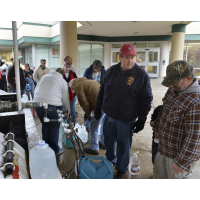Coal-Related Toxic Tap Water Emergency in West Virginia
 Water distribution after chemcial spill in Elk River in Charleston, West Virginia (photo: Craig Cunningham, Charleston Daily Mail-AP)
Water distribution after chemcial spill in Elk River in Charleston, West Virginia (photo: Craig Cunningham, Charleston Daily Mail-AP)
About 300,000 people in the Charleston, West Virginia, area are without useable tap water because of a chemical leak into the Elk River, just a mile upriver from the intake valves of a water plant that supplies the Charleston area—and no one knows when the water will be fit for use again. Gov. Earl Ray Tomblin ordered a ban on drinking, bathing and cooking with tap water in Charleston and nine surrounding counties, prompting shortages of bottled water in and around the state’s capital and most populous city.
The disaster began early Thursday, although conflicting accounts from the owner of the ruptured tank, chemical company Freedom Industries, and the state Department of Environmental Protection (DEP) have already muddied the waters.
According to DEP, area residents reported a foul, licorice-like odor in the air, which DEP and firefighters traced to a 35,000-gallon storage tank along the Elk River that had overflowed its containment area and migrated over land and through the soil into the river. The tank was one of 14 that were part of a former Pennzoil refinery dating back to the 1930s or 1940s, according to local sources.
Although Freedom Industries has claimed its workers discovered the leak on their own around 10:30 am on Thursday, DEP inspectors reported no cleanup underway when they discovered the leak at 11:10 am.
The chemical that leaked, 4-methylcyclohexane methanol (sometimes called “Sextol”), is used by the coal industry to wash coal of impurities. Sextol irritates the eyes, skin and respiratory tract, and can cause seizures, ataxia, lacrimation, corneal necrosis, salivation, nausea, vomiting, and diarrhea. Prolonged exposure can cause headaches and skin rash, while high exposures may cause damage to the heart, liver, kidneys, and lungs, and even death.
Jeff McIntyre, president of West Virginia American Water Co., told reporters Friday that he didn’t think the Sextol was still leaking, but warned that “It is not intended to be in the water (or) distribution system.…Once it’s in there, there’s no more treatment for it.” Officials also said they believe the leak was limited to 7,500 gallons, but further investigation is needed.
Although the direct health impact of the spill has apparently been so far limited to 122 people visiting hospitals because of nausea or vomiting and five patients taken to emergency rooms, the leak is having a big impact. Stores, restaurants and other businesses closed on Friday, as did the state Supreme Court of Appeals and West Virginia State University.
A lawsuit has already been filed. A local kidney patient, Daniel Stewart, sued the water company and Freedom Industries, claiming his kidney transplant was canceled because of the lack of water, “forcing (him) to undergo dialysis, pain and suffering and continued illness due to his renal failure and other medical damages.” He alleges the water company “failed to maintain an appropriate emergency response plan,” and that Freedom “failed to properly maintain and store its chemicals.”
Also on Friday, the DEP ordered Freedom to empty its remaining above-ground storage tanks pursuant to “cease operations order” that the tanks must remain empty until the company addresses the leak and proves its structures are sound.
-Matt Bewig
To Learn More:
The Wait Continues for Safe Tap Water in West Virginia (by Daniel Heyman and Emma G. Fitzgerald, New York Times)
Chemical levels in West Virginia water drop, but still no end in sight to ban (by Greg Botelho and Tom Watkins, CNN)
Thousands Without Water After Spill in West Virginia (by Trip Gabriel, New York Times)
The 6 Most Terrifying Facts About The Chemical Spill Contaminating West Virginia’s Drinking Water (by Katie Valentine, ThinkProgress)
- Top Stories
- Unusual News
- Where is the Money Going?
- Controversies
- U.S. and the World
- Appointments and Resignations
- Latest News
- Musk and Trump Fire Members of Congress
- Trump Calls for Violent Street Demonstrations Against Himself
- Trump Changes Name of Republican Party
- The 2024 Election By the Numbers
- Bashar al-Assad—The Fall of a Rabid AntiSemite






Comments